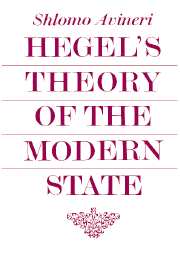Book contents
- Frontmatter
- Contents
- Title in the Series
- Preface
- 1 Beginnings
- 2 Positivity and Freedom
- 3 The Modernization of Germany
- 4 The New Era
- 5 Modern Life and Social Reality
- 6 The Owl of Minerva and the Critical Mind
- 7 The Political Economy of Modern Society
- 8 Social Classes, Representation and Pluralism
- 9 The State – the Consciousness of Freedom
- 10 War
- 11 The English Reform Bill – the Social Problem Again
- 12 History – the Progress towards the Consciousness of Freedom
- Epilogue
- Bibliography
- Index
7 - The Political Economy of Modern Society
Published online by Cambridge University Press: 05 June 2012
- Frontmatter
- Contents
- Title in the Series
- Preface
- 1 Beginnings
- 2 Positivity and Freedom
- 3 The Modernization of Germany
- 4 The New Era
- 5 Modern Life and Social Reality
- 6 The Owl of Minerva and the Critical Mind
- 7 The Political Economy of Modern Society
- 8 Social Classes, Representation and Pluralism
- 9 The State – the Consciousness of Freedom
- 10 War
- 11 The English Reform Bill – the Social Problem Again
- 12 History – the Progress towards the Consciousness of Freedom
- Epilogue
- Bibliography
- Index
Summary
THE PREMISSES
In his Encyclopedia of Philosophical Sciences, Hegel divides the section dealing with the philosophy of spirit into three parts: subjective spirit, objective spirit and absolute spirit. The part on objective spirit is then dealt with in much greater detail in the Philosophy of Right. It is this part which concerns itself with law, morality and ethical life (Sittlichkeit) as the objective, institutional expressions of spirit. And though the state stands, as we shall see, at the apex of objective spirit, it is still inferior (as we have already seen in the Realphilosophie) to the realm of absolute spirit – i.e. art, religion and philosophy.
Objective spirit is the realm within which human consciousness comes into its own: ‘Ethical life is the unity of the will in its concept with the will of the individual.’ This unity of content and form when integrated into consciousness is freedom; its political expression has already been formulated in the System der Sittlichkeit, where Hegel said that ‘the organic principle is freedom, so that those who govern are themselves the governed’.
Yet the attainment of this freedom is not given; it has to be mediated. The history of man is the history of man gaining self-consciousness through his interaction with the objective world surrounding him. This is education, Bildung; man becomes free. His freedom is not to be found in any legendary state of nature, but evolves precisely out of his effort to dissociate himself from his state of primeval savagery: ‘The savage is lazy and is distinguished from the educated man by his brooding stupidity.’
- Type
- Chapter
- Information
- Hegel's Theory of the Modern State , pp. 132 - 154Publisher: Cambridge University PressPrint publication year: 1972

